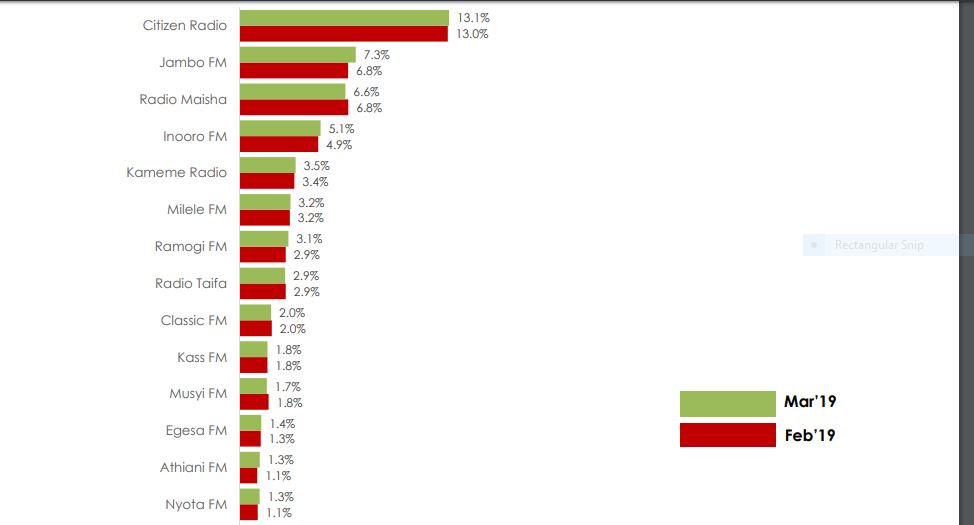Radio remains the most preferred media channel in Kenya, according to the latest survey on audience tastes in Kenya, but that could change as online media begins to edge up.
The survey by KARF in February and March gives radio an average of 64.5% audience reach for the two months, way ahead of TV at 49.5% and newspapers at just 9.5%. Online is growing its audience steadily, hitting an average of 28.5% in February and March.
The survey shows radio reached 64% and 65% audience in February and March, while TV hit 49% and 50%, followed by online at 27% and 30% as newspapers homed in at 9% and 10%. Magazines were the least read at 0.2 and 0.1%.
In terms of radio reach, Citizen Radio owned by Royal Media Services, retains the national lead at 13% reach for both Feb and March, followed by Radio Jambo of Radio Africa Group at 7.3% and 6.8%, in February and March respectively, and Standard’s Radio Maisha with 6.6% and 6.8%.
The fourth place is taken by Inooro FM (RMS), followed by Kameme FM (Mediamax), while in the sixth position is Milele FM, also owned by Mediamax. Top 5 includes two vernacular radio stations – Inooro and Kameme – underscoring the strength in numbers and wide geographical spread of the Kikuyu speaking population in Kenya.

In the key Nairobi region, tables are revered with Radio Jambo taking the lead at 15.3% and 15.7% reach in February and March, followed by Radio Citizen at 13% and 14.4%. Ghetto radio, which broadcasts in the informal sheng language, comes in third at 5.0% and 5.1% followed by Ramogi and Classic FM. Central Kenya region is led by Inooro FM, followed by Kameme FM.
Other vernacular radio stations topping their regions include Egesa in South Nyanza, dominated by Kisii speakers, and Ramogi FM and Namlolwe in Lake Victoria region, which is inhabited by the Luo community. Musyi leads in lower eastern followed by Athiani FM, while Meru FM tops in upper eastern region.
The trends prove how powerful regional/vernacular radio stations have become not only in attracting audiences but also driving public agenda and advertising revenues for media houses.
Kiswahili radio stations still retain popular attraction with Citizen Radio, Radio Maisha and Radio Jambo, among others, having a big following across the country. The much-hyped English radio stations such as Classic FM, Kiss FM, One FM, etc trail in ratings. Among this more urban segment of English radio stations, Classic tops the list with a national audience of only 2%. The rest do not feature even in the top 15 slots.
The survey notes that there has been a significant growth of community radio stations which have increased the geographical footprint compared to other media platforms. The Kenyan market currently has 356 radio stations and growing.
READ: Smaller Stations Robbing Market Share from Citizen TV
The survey shows that there are 467 TV stations in the Kenyan market, with 66 of them being local. Other TV stations are emerging on the digital platform.
In terms of overall popularity in the broadcast sector, radio continues to be king as it has high penetration or levels of access. Access to newspapers remains low, with around 9.5% of those interviewed reading a newspaper. As at the time, there were 44 newspapers in Kenya 62 magazines.













Leave a comment